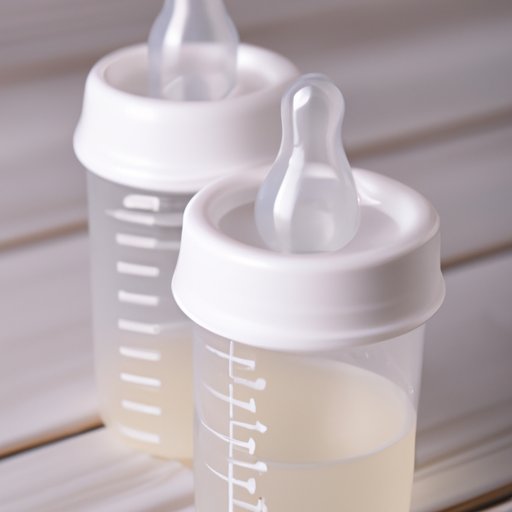
Introduction
As a parent, it’s understandable to want to provide your baby with all the sustenance they need to grow and thrive. While it’s common knowledge that breast milk or formula is the best source of nutrition for infants, many parents are left wondering when it’s safe to introduce water into their baby’s diet. In this article, we’ll explore when you can give babies water and the potential dangers associated with giving water to a baby too early. We’ll also provide tips on safe ways to introduce water to a baby’s diet.
The Importance of Breast Milk or Formula for the First Six Months of a Baby’s Life
Breast milk or formula is the primary source of nutrients for babies during the first six months of life. Breast milk provides a unique blend of proteins, fats, and vitamins that are essential for a baby’s growth and development. Formula is also designed to mimic the nutritional benefits of breast milk, providing infants with all the nutrients they need to thrive.
During this time, water isn’t necessary for baby’s nutrition and can actually be harmful. Breast milk or formula provides all the hydration a baby needs to stay healthy. Giving water to an infant under six months old can cause several issues, as we’ll explore next.
The Possible Dangers of Giving Water to a Baby Too Early
Water intoxication is a condition that occurs when a baby consumes too much water. This can happen when babies are given water too early or in excessive amounts. Young babies have immature kidneys that are not yet equipped to handle large amounts of water intake, which can lead to water intoxication. In severe cases, water intoxication can cause seizures, brain damage or even death. This is why it is recommended to avoid giving water to an infant until they are at least six months old.
Giving water too early can also reduce a baby’s milk intake. When babies consume water, they start to feel full, causing them to consume less breast milk or formula, which can have negative impacts on their growth and development.
It’s essential to adhere to specific feeding guidelines recommended by healthcare providers in the first six months of life to ensure that babies get the nutrition and hydration they need to grow and thrive.
Circumstances Under Which Water Is Safe to Give to a Baby
After the age of six months, it is generally safe to start giving water to a baby. As babies grow, their need for hydration increases, especially during hot weather. However, this doesn’t mean water should replace breast milk or formula. Babies still need breast milk or formula as their primary source of nutrition, and water should be introduced gradually alongside solid foods.
It’s essential to note that water requirements may vary between exclusively breastfed versus formula-fed babies. Breastfed babies may require less water than formula-fed babies because breast milk contains more water than formula. On the other hand, formula-fed babies may require more water due to the increased concentration of formula in their diet.
When introducing water to a baby’s diet, it’s important to provide small sips of water from a sippy cup during mealtime. It is not recommended to allow babies to drink from a bottle while lying down, as this can cause ear infections.
Differences Between Giving Water to a Breastfed Baby vs. a Formula-fed Baby
As mentioned earlier, breastfed babies may require less water than formula-fed babies because breast milk contains more water. It’s essential to note that over-diluting formula with water can cause significant harm to infants, including malnutrition. To avoid this, it’s essential to follow the manufacturer’s instructions when preparing formula and avoid adding too much water. Diluting formula with too much water can prevent babies from getting enough nutrients that are essential for their growth and development.
Advice on Safe Ways to Introduce Water to a Baby’s Diet
If you’re unsure when to start giving water to your baby, consult your child’s pediatrician. They can guide you on the appropriate time to introduce water and how much water your baby needs. It’s recommended to start with small amounts of water and gradually increase the amount as time goes on.
Another way to introduce water safely is by offering small sips of water during mealtime. Introduce water as a supplement, and don’t force your baby to drink water if they don’t feel like it.
Lastly, it’s essential to remember that water should never substitute breast milk or formula in an infant’s diet. Babies need breast milk or formula to grow and develop correctly, and water is just an additional source of hydration.
Conclusion
Understanding the right time to introduce water to a baby’s diet is essential for their growth and development. Breast milk or formula is the best source of nutrition for infants during the first six months of life, and water should only be introduced gradually after six months of age. It’s essential to consult your child’s pediatrician before introducing water to your baby, and follow their guidelines to ensure optimal hydration and nutrition. Remember to start with small sips of water and to never substitute water for breast milk or formula.




